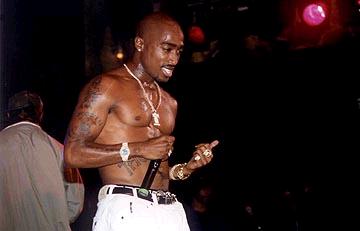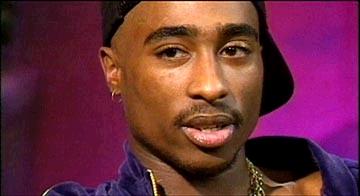

It's hard to believe that seven years after the death of rapper Tupac Shakur, Tupac: Resurrection, a new documentary, hits theaters and it narrated by Shakur. This follows Biggie and Tupac, a documentary released last year that flopped at the box office. The large difference was that the latter was a small independent film, while this one has the marketing dollars of a major studio backing it (Paramount) and has the blessing of Afeni Shakur, Tupac's mother. The purpose of this so-called documentary is to present a picture of who Tupac was, in his own words. On a more callous note, it's also a great chance to reap in some more money by releasing yet another posthumous album of new material to tie into the film.
The reason that director Lauren Lazin can cull together enough audio for Tupac to narrate his own documentary is that he was so open and vocal (and prolific, as the number of posthumous albums attest). Unlike most rappers, and many people in America, Tupac had a good education. He went to a magnet school where he immersed himself in all sorts of music and literature, and was able to develop an appreciation for these various styles. He wrote poetry, and his mother and many of the paternal influences in his life were activist members of the Black Panthers. It was this fascinating dichotomy that was one of his best assets in his music career. He was smart. He was articulate. He had a way of writing about life as he knew it into his songs.
And, he was able to express his many opinions often and television and radio interviews. Most importantly, Tupac understood his own limitations and his own failings. He freely admitted to the mistakes he made, yet paradoxically soon made them again. Tupac was a huge figure in the media because of his violent lyrics and his continual brushes with the law. There is a huge amount of material to choose from, and Lazin does an interesting job of piecing together his portrait of Shakur, with a lot of emphasis on his formative years. Lazin believes correctly that to understand Shakur, one needs to understand where he came from. He worked hard, and partied hard. Part of the reason that there is still a huge amount of unreleased material is that he maniacally recorded new material in the studio, far more than what he could fit onto albums.
However, it does have the feel of a fluff piece about it. There are some really annoying POV shots of clouds and narration, hinting that Tupac is in Heaven, but thankfully these quickly taper off. Tupac's charisma is what keeps Tupac: Resurrection interesting, even with the one-sidedness. After watching the film, one does get a better idea of who Tupac was. As Tupac became more popular, he branched into acting and began developing his code of "thug life." Later, he was a pivotal member in the East Coast/West Coast rap war, and signed onto controversial producer Suge Knight's Death Row Records label. His life became infinitely more complicated at this point, and as he neared his death, Lazin seems to speed things up, glossing over events that he could examine in much more depth. For a fuller picture, watch this film, then watch Biggie and Tupac.